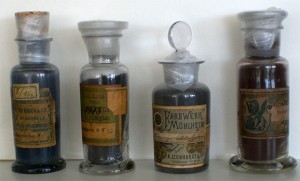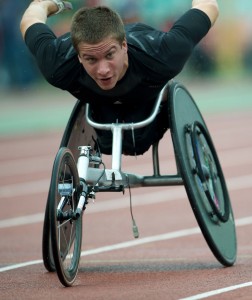A museum has a thousand objects in its possession, but sometimes just the right one is missing! Last winter when I was preparinga new showcase in the permanent exhibition on the Nobel Prize winner Paul Ehrlich, I didn’t have enough pieces to create a coherent presentation for the exhibit.
I wanted to illustrate Paul Ehrlich’s achievement in the field of medicine with documents and paraphernalia from his work, but didn’t find any appropriate objects in our collection. Nonetheless this significant scientist was to appear in our exhibition. He developed a cure for syphilis, founded modern cancer research, and brought many important, trendsetting research results to light.

Jars of dye that Paul Ehrlich needed for his famous experiments with dye, Paul Ehrlich Institute, Langen
© photo: Christiane Bauer, Jewish Museum Berlin
So I began to search for suitable exhibit pieces and found my way to Hessen: both the Paul Ehrlich Institute in Langen and the Georg Speyer House in Frankfurt – Paul Ehrlich’s last and most significant workplace – have an impressive store of items related to his work and influence. But how to bring these objects to the museum in Berlin? → continue reading
Just a few weeks ago in Stoke Mandeville, England, a large bronze statue was unveiled in honor of a Jewish physician from Breslau, who – despite his moving story, his pioneering efforts, and the international significance of his work in Germany – is virtually unknown here:

Marc Schuh, wheelchair racer (medium distance), member of the German team at the London Paralympics, 2012 © Behinderten-Sportverband Berlin e.V.
Ludwig Guttmann, the father of the Paralympic Games that were opened in London on 29 August. More than two and a half million spectators will cheer on the over 4,000 athletes there. Guttmann is well-known in Britain, where he was awarded the Order of the British Empire and where the BBC made a film about him entitled “The Best of Men.”
Ludwig Guttmann was born to an orthodox Jewish family in Tost, Upper Silesia in 1899. He grew up in Chorzów, where he worked at the hospital for the first time with paraplegics. Following his medical training in Breslau and Freiburg, he specialized in the young field of neurosurgery from 1924 and was soon considered one of its leading doctors. After Hitler’s rise to power in 1933, Guttmann was no longer permitted to practice in a public hospital. Despite several offers from America, he stayed in Germany and took up a specialist post at the Jewish Hospital in Breslau where he later became director. When he learned of the violent excesses during the November Pogrom in 1938, he instructed his staff to admit all refugees to the hospital without examination. In spite of a Gestapo investigation at the hospital, he was able to save 60 Jewish citizens from arrest and deportation to a concentration camp. → continue reading

